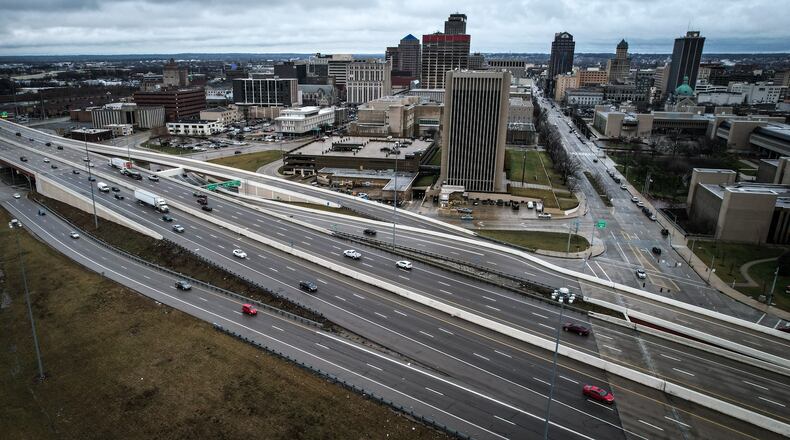Dayton police Major Jason Hall, commander of the patrol operations division, said it’s possible this change will negatively impact the city’s ability to get state or federal funds for things like transportation safety projects and improvements.
“It is a concern to us,” he said.
Credit: JIM NOELKER
Credit: JIM NOELKER
Less paperwork
Since July 17, Dayton police officers have stopped investigating minor, non-injury traffic crashes, Hall said.
Police will still respond when they receive calls for service about traffic crashes, but they aren’t completing accident reports unless there are injuries that require medical transport, or if one or more vehicles involved were so badly damaged that they need to be towed, Hall said.
Police also will fill out reports when there are hit-and-runs and crashes involving intoxicated drivers.
After fender-benders and other minor crashes, police officers will respond to the scene to help clear the roadway and ensure motorists exchange information, he said.
But eliminating the paperwork component will be a big time-saver, officials say.
Last year, Dayton police responded to more than 3,250 calls for service related to minor crashes, and each call on average took officers about one hour and 20 minutes to clear, police data show.
Dayton police spent about 4,525 hours last year handling non-injury, traffic crashes.
Ohio law requires citizens involved in auto crashes to exchange information. It does not require police to complete crash reports.
Hall said cities across the nation have taken similar steps and adopted the same kinds of policies, including Columbus; Tucson, Arizona; Milwaukee, Wisconsin; Dallas, Texas; and Nashville and Knoxville, Tennessee.
Some communities no longer send police out at all to minor automobile crashes.
Hall said hopefully this change will result in officers having more time to address more important community concerns and priorities, like speeding.
The new policy likely means the city is going to see a significant decline in the number of recorded automobile crashes.
Possible downsides
Police officials said this reduction potentially could impact how well the city scores when it seeks funding for traffic and transportation safety investments.
State and federal funding is made available to communities based on a collection of data, including property damage and minor injury crashes, said Loryn Bryson, public information officer with the Ohio Department of Transportation (ODOT).
ODOT safety funds are specifically tailored to prevent serious injuries and fatal crashes, and the total number of crashes can be a factor in funding decisions, she said.
Bryson also said the criteria and scoring for safety funding applications are based on the numbers of fatal crashes, serious injury crashes, all injury crashes and high severity crash types.
Brian Martin, executive director of the Miami Valley Regional Planning Commission, said his agency has contacted the state to notify them of the police department’s policy change.
MVRPC leads regional transportation planning efforts and helps secure funding for projects.
Martin said the good news is that federal and state funding related to crashes focuses on the most severe incidents instead of the overall quantity.
“As (Ohio Department of Transportation) traffic professionals have commented, in the future we may see that Dayton has fewer crashes overall but the severity goes up, all because they aren’t reporting the minor crashes,” Martin said. “We will look into this more and see how it’s going when we receive affirmative notice on our Safe Streets and Roads for All grant pursuit that we made on behalf of the region’s largest counties.”
Possible changes
Hall said the city is exploring the idea of setting up a system that allows people to submit information about auto crashes online. He also said the police department possibly could try to get some crash data from 911 dispatch.
There are also some insurance implications.
Changes like Dayton’s make the driving record reports that insurers get from motor vehicle departments less useful for underwriting purposes, said Robert Passmore, department vice president of personal lines for the American Property Casualty Insurance Association.
From an insurer’s perspective, it is helpful to have a police report that records the names of the people involved in a crash, as well as a basic account of what happened, Passmore said.
But for the most part, Passmore said insurers will do their own investigations, and the lack of a police report should not cause problems.
“Since there are significant penalties for making a false police report, that is thought to provide some deterrent to fraud,” he said.
About the Author



